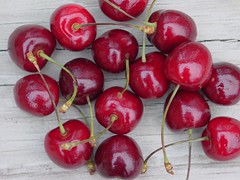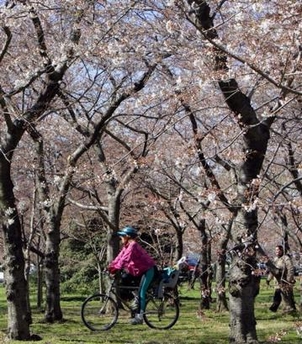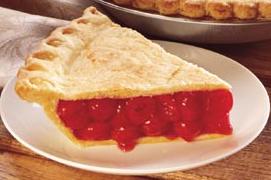An indication that people really don't understand where food comes from...
 Edible cherries.
Edible cherries.Newspapers and politicians have a fondness for young children aiming to influence the political process. I've written before (in January) about the quest of some children in SW DC to get the city to declare the cherry the official fruit of the city, because of the Sakura (Japanese) cherry trees that define the Tidal Basin, as well as historical associations with George Washington and his alleged chopping down of a cherry tree.
Today's Post has a story about this again, that the students have succeeded in getting a bill introduced by Chairman Cropp, which will be heard on June 6th. The story, "Civics Is Sweet for SW Students," discusses the process:
Bunton gave them a little nudge in the fall after they read about fourth-grade students at an elementary school in Sarasota, Fla., who successfully lobbied the state legislature a year ago to designate the orange the state's official fruit. "I said, 'What do y'all think the fruit should be?' " Bunton recalled.
"The apple," shouted Sheldon McFadden, 11. Sheldon thought it was a natural choice. After all, there was the supposed fable about George Washington's childhood lesson in honesty. He cut down the "apple tree," Sheldon insisted....
Note to teachers: oranges are grown, on trees, in Florida. Orange production is a key component of the agricultural economy of Florida. CItrus production is the number two agricultural product of the state after sod and plants necessary to outfit the yards for new houses built in sprawl. People in Florida even consume oranges that are grown in that state. For more information about this, see "Florida Crop/Pest Management Profiles: Citrus (Oranges/Grapefruit)" from the State of Florida Co-operative Extension Service.
 Orange Production zones, State of Florida.
Orange Production zones, State of Florida.The initiative in DC bothers me because the Sakura tree doesn't produce edible fruit, and the point of the designation of a city (or state's) official fruit is the promotion of the link between agriculture and the community.
 These trees do not produce edible cherries, but they are pretty. Caption: A bicycle rider rides through the Cherry Blossom trees, Monday, March 27, 2006, near the Tidal Basin in Washington. The 2006 National Cherry Blossom festival which began Saturday marks the 94th celebration of the original gift of 3,000 cherry trees from the City of Tokyo to the people of Washington in 1912. (AP Photo/Ron Edmonds)
These trees do not produce edible cherries, but they are pretty. Caption: A bicycle rider rides through the Cherry Blossom trees, Monday, March 27, 2006, near the Tidal Basin in Washington. The 2006 National Cherry Blossom festival which began Saturday marks the 94th celebration of the original gift of 3,000 cherry trees from the City of Tokyo to the people of Washington in 1912. (AP Photo/Ron Edmonds)Instead of thinking of this as cute, I think this is an opportunity for a "teachable moment." Clearly such is necessary because these schoolchildren, like many of us, appear to be disconnected from understanding that food is grown, by farmers (and agribusiness), it doesn't just end up magically on the shelves of the local supermarket.
I know a couple years ago, a group of people in the neighborhood north of H Street NE attempted to create a community garden, and tried to do this on the front lawn (unused, ornamental only, and only occasionally tended) and they were informed that the DC Public Schools doesn't allow community gardens on school lands. (Note that the Watkins School has an extensive gardening project on the school grounds.)
Is it a surprise that students and teachers appear to be disconnected from agriculture and lack an undertanding of how food is grown, produced, and distributed.
 A cherry pie is made using cherries, as well as other ingredients.
A cherry pie is made using cherries, as well as other ingredients.For more information on cherry production, see the website for the Cherry Marketing Institute.
I will be out of town at a conference in New Orleans, otherwise I would testify against this (to quote Crosby, Stills, and Nash "It's getting to the point, where I am no fun anymore") .
For a different take on bringing real lessons about agriculture to the urban setting, check out this article about Philadelphia, "Sowing Seeds of Change: Down On The Farm In Philadelphia: Some People Are Boldly Rethinking What A City Can Be. On Blighted Or Forgotten Blocks, They See Fields Of Opportunity."
Also Community Harvest has a small 1 acre farm in SE DC. "The farm is run on the following principles:
- the use of sustainable, chemical-free growing methods;
- a strong commitment to selling produce in low-income neighborhoods at a fair price; and
- the involvement of local residents in the farm’s production, empowering them in the improvement of their neighborhood’s food security, and providing educational and recreational opportunities.
Urban Oasis grows vegetables, herbs and flowers for distribution in local underserved communities. In 2005 the produce was sold at the Anacostia Farmers Market on Wednesdays. ... Produce is also donated to the Missionaries of Peace soup kitchen in Congress Heights.
Click here for more information about the Urban Oasis Community Farm and Learning Center.
Index Keywords: food-agriculture-markets



0 Comments:
Post a Comment
<< Home